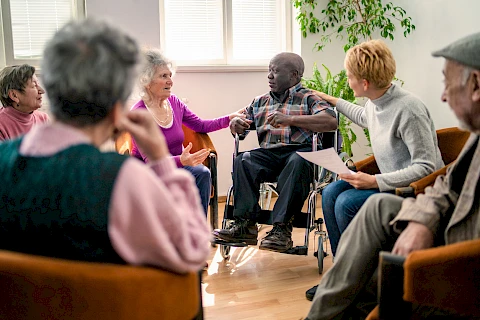
Post-traumatic stress disorder, or shell shock, is a complex mental health condition that's often misunderstood. This lack of understanding can be particularly pervasive, many may hold senior PTSD misconceptions or outdated views about this condition. June is PTSD Awareness Month, and we believe it's critical to debunk these myths and shed light on the true nature of PTSD. Insight into battle fatigue can lead to better empathy, improved self-awareness, and better well-being for those affected, especially elderly loved ones.
1) PTSD Only Affects Military Personnel
One of the most common senior PTSD misconceptions is that it solely concerns service veterans. While combat situations can trigger shell shock, it's not confined to this group. Trauma disorder can impact anyone who has been through a traumatic event. Accidents, natural disasters, physical or emotional abuse, life-threatening illnesses—all of these can lead to the development of psychological trauma.
2) Shell Shock Is a Sign of Weakness
Another false belief is associating PTSD with weakness. The truth is that the development of a trauma condition is not a testament to someone's strength or weakness. Psychological trauma is essentially the brain's reaction to protect us from traumatic events by creating a fight-or-flight response. Anyone can encounter a trauma that triggers this response.
3) Battle Fatigue Is Just Another Term for Anxiety
While both psychological trauma and general anxiety can cause constant worry and uneasiness, they are not the same. Shell shock is trauma-specific. It's a result of experiencing or witnessing a life-threatening or highly stressful event. Unlike general anxiety, PTSD often includes reliving the traumatic event, avoidance behaviors, and hyper-arousal symptoms like being easily startled.
4) Trauma Disorder Is Uncommon in Older Adults
Just because people are in their golden years doesn't mean they're immune to battle fatigue. Seniors can develop PTSD due to a variety of life events, including unexpected loss, a loved one's passing, serious accidents, or severe health issues. Some older retirees might have been living with undiagnosed psychological trauma for years.
5) Psychological Trauma Can’t Be Treated in Seniors
Trauma disorder is treatable at any age. Various treatment options such as cognitive-behavioral therapy (CBT), eye movement desensitization and reprocessing (EMDR), and medication are available. Such treatments, especially when tailored to individual needs, can improve the quality of life for those suffering from shell shock.
6) The Symptoms Are Obvious
Not all wounds are visible, and battle fatigue often fits into that category. While some manifestations can be observed, like nightmares or flashbacks, others are not as explicit. It's essential to remember to listen and look beyond surface appearances to understand what older adults might be going through.
We're Here to Help
This PTSD Awareness Month let's work together to debunk senior PTSD misconceptions and support our loved ones living with shell shock. If you or an elderly loved one lives in Lees Summit, Blue Springs, or Kansas City MO, and could use some support or assistance with in-home care, contact us today at Senior Helpers Lee's Summit.